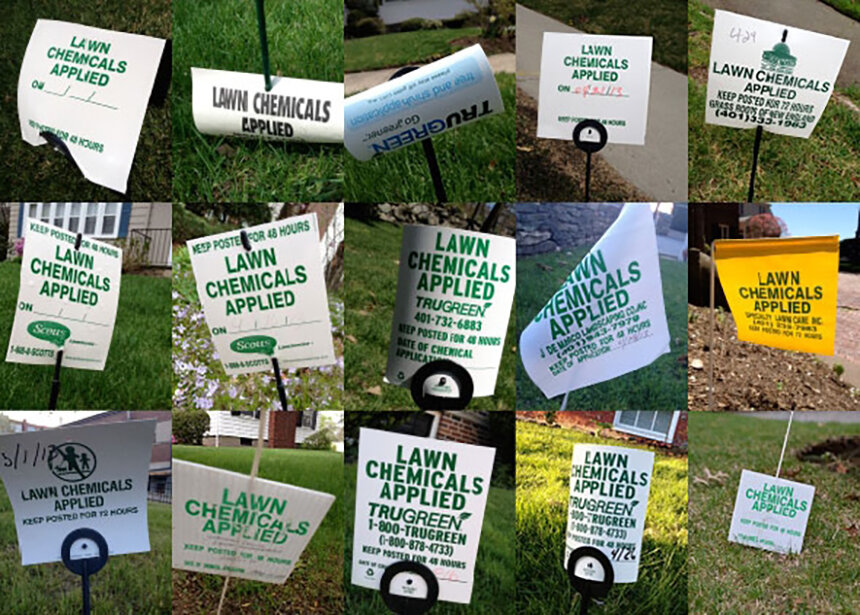Want a Healthy Lawn with No Warning Flags? Go Organic
April 10, 2016
For decades, lawn-care professionals and amateur green thumbs have dumped pesticides and fertilizers onto lawns in hopes of creating lush, green carpets.
In fact, Americans spend some $40 billion annually on the upkeep of their lawns, with much of that money spent on the overuse of fertilizers and pesticides, according to Beyond Pesticides, a Washington, D.C.-based nonprofit.
Herbicides account for the highest usage of pesticides in the home and garden sector, with more than 90 million pounds applied to lawns and gardens annually. Pesticide sales average $9.3 billion a year, as nearly 80 million households in the United States use lawn and garden pesticides, according to Beyond Pesticides.
There are, however, better ways to grow green lawns, according to local environmental advocates. The easiest, safest and cheapest solution is to avoid synthetic chemicals and use alternative lawn-care methods, such as applying organic fertilizers, composting, cutting down on watering — lawns only need an inch of water a week — limiting the amount of impervious surfaces on your property, and installing rain barrels to catch roof runoff, to be used later for watering.
Another way to help cut down on the amount of lawn chemicals is to replace areas of grass with native plants, which have adapted to this climate and are more pest resistant. Adding native plants also attracts beneficial insects, such as dragonflies and ladybugs, that feed on pests.
Here are a few more tips to care for your lawn without relying on synthetic fertilizers and pesticides:
Grow a diversity of grasses and shrubs. Clover and dandelions make a lawn stronger and more drought resistant.
Keep the grass at least 3.5 inches to strengthen roots and shade out weeds.
Leave grass clippings on the lawn. Clippings provide about 50 percent of the fertilizer a soil needs.
Aerate the lawn to allow air, water and worms to cultivate the soil.
Apply ample seeds frequently with compost.
Apply organic fertilizer, especially in the fall.
Be careful of the terms being used to sell fertilizer. For example, “natural” means nothing. Look for organic fertilizers that contain insecticidal soaps, diatomaceous earth, milky spore, nematodes and corn gluten. Compost in air-tight packaging can’t be alive, even if the label says otherwise. Compost needs oxygen to live, and without it, beneficial microscopic life, such as nematodes, can’t survive.
Don’t be initially turned off by the price for organic. It may cost more upfront, but over time will require less application and watering. In general, organic fertilizers improve the soil — instead of feeding the lawn or plant — making grass and landscaping more durable and safer.
In fact, Rhode Island is home to one of most well-known advocates for organic lawn care — Paul Tukey, the Maine native and landscaping professional acclaimed for his conversion to organic lawn products and his book “The Organic Lawn Care Manual.”
In the early 1990s, Tukey built a successful lawn and garden business in Maine as an avowed user of synthetic fertilizers. A medical scare and subsequent doctor’s order, however, convinced him to kick the chemical habit. He has since converted his landscaping business to one that is fully organic, and has launched a new career writing, speaking and promoting organic lawn and garden maintenance.
He says that as soon as chemicals are put down the soil instantly loses its ability to sustain life. He notes that the best materials for lawn and plant care come form natural materials, such as food scrap and yard waste turned into compost.
Charles “Chip” Osborne Jr., a Marblehead, Mass.-based turf consultant, is a longtime horticulturist and another former devotee of chemical pesticides. However, he eventually realized that pre-World War II, ecology-based lawn and gardening techniques are ultimately best for the environment and public health.
In 2002, Osborne began switching athletic and municipal fields in Marblehead to an organic, soil-nourishment program. The transition to natural field applicants required a leap of faith from local residents, but the rewards have been stunning. The town now features numerous lush and virtually weed-free playing fields and lawns. There are no yellow warning signs planted in these areas.
Switching to natural fertilizers typically requires changing application methods from constant chemical applications to aeration, compost additives and seeding. This method feeds the soil, which allows grass to grow deeper, and become heartier and less susceptible to weeds and pests.
By contrast, Osborne says, fields treated with synthetic fertilizers create shallow, weak grasses that require frequent treatments to eliminate weeds and bugs. To make matters worse, some 65 percent of chemical fertilizers are washed away in runoff, according to Osborne.
Fall is the best time to start transitioning your lawn to organic, according to Beyond Pesticides.
ecoRI News staffer Tim Faulkner contributed to this report.




Why wait till fall? Spring is a great time to work towards an organic lawn. Start with a soil test to see if your soil needs any amendments such as lime. Now!! is the time to apply corn gluten not only to fertilize your lawn, it also prevents germination of annuals weed seeds such as crabgrass. Raising mower height to 3.5 inches also helps prevent weeds. All suggestion in above article can be started now though seeding is best left till autumn. We have operated a organic landscaping company in Green Hill RI for the past 38 years. Don’t stop with your lawn, your gardens will love going organic, and they will show their appreciation